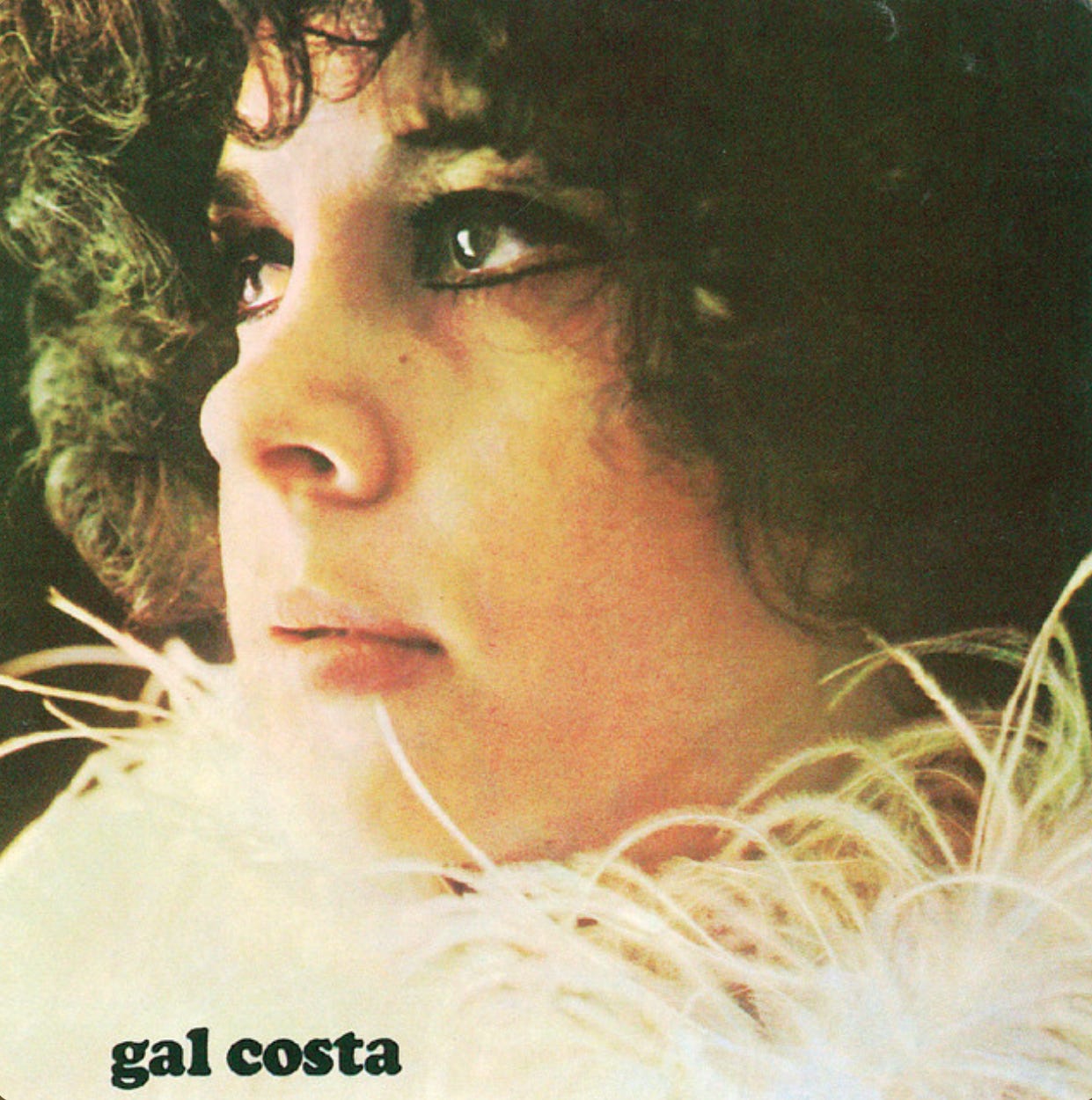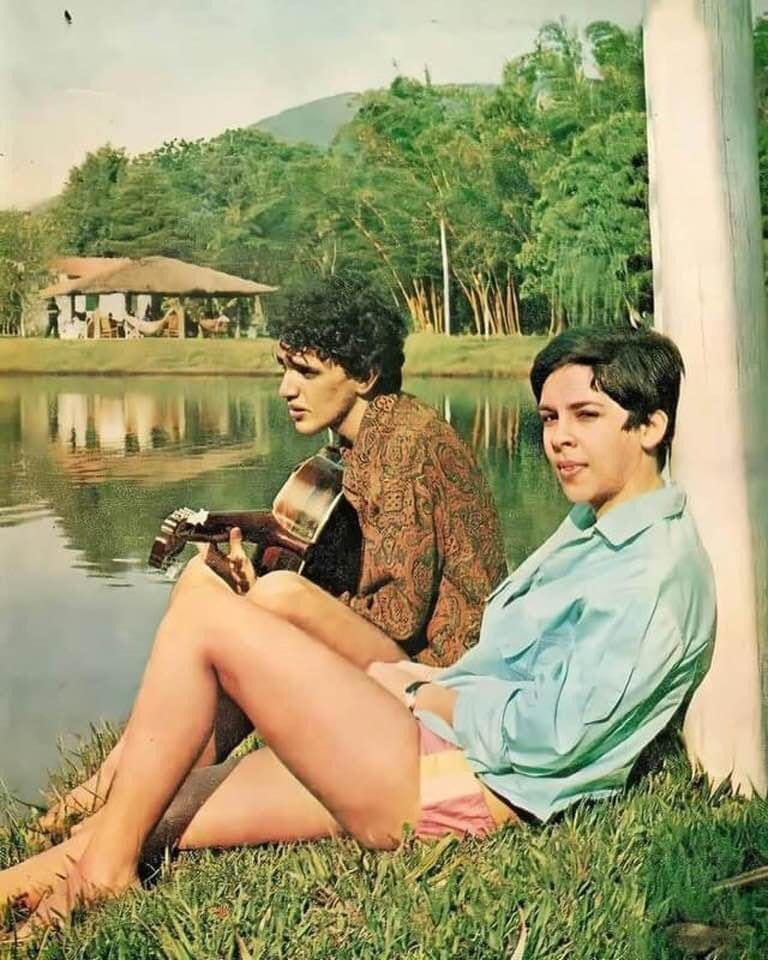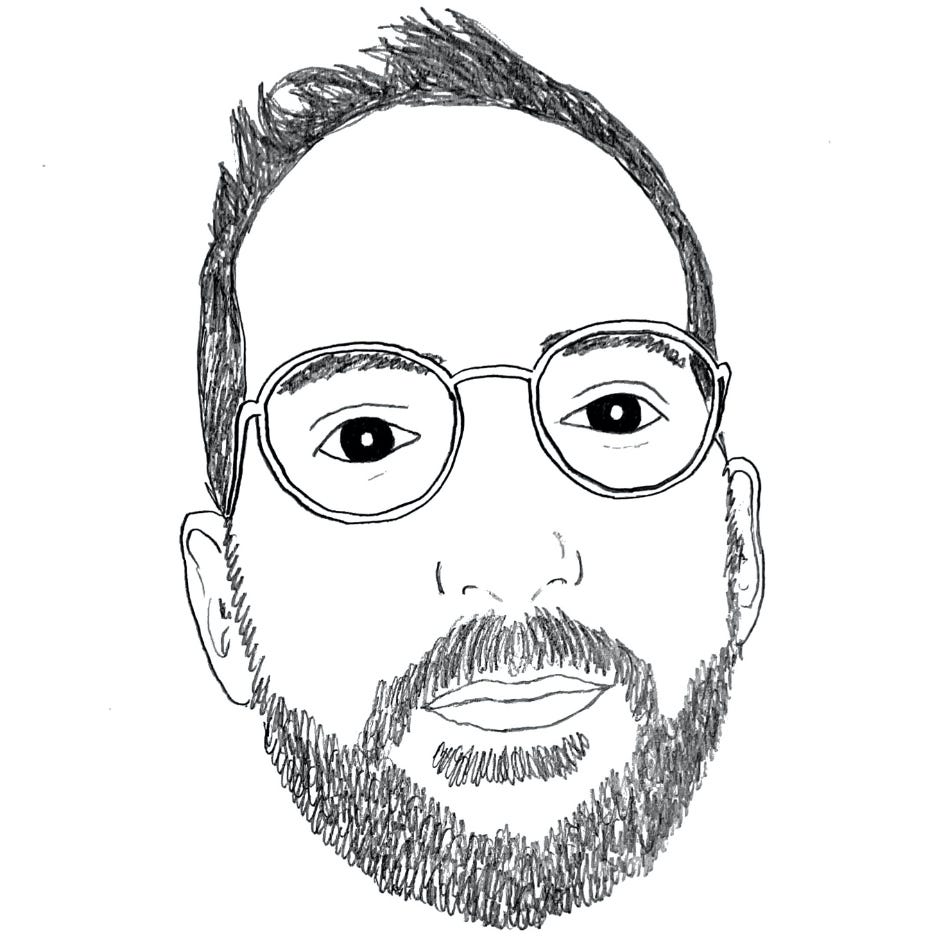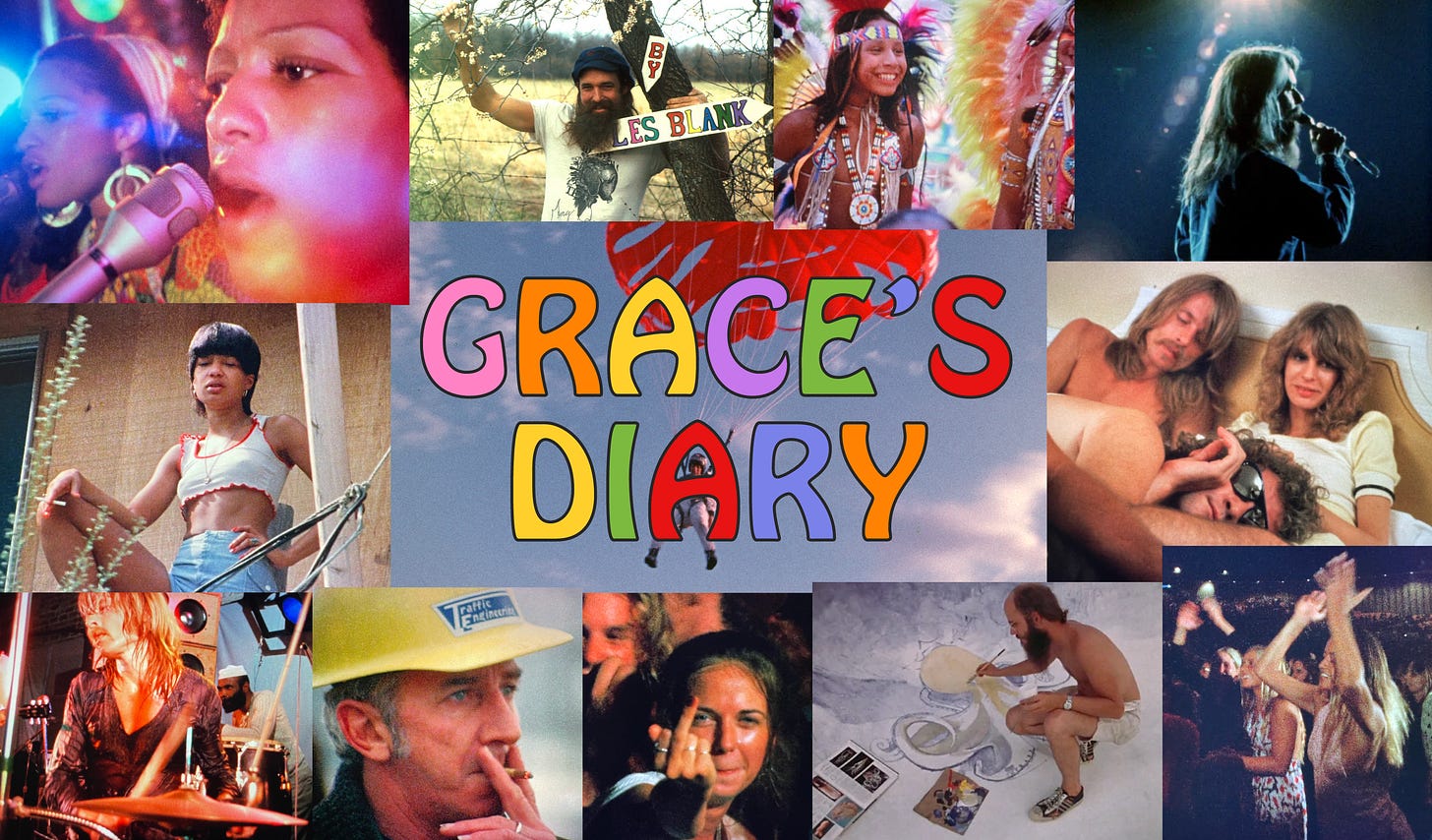No. 034 - Gal Costa's “Baby” changed my life
Oren Peleg's letter to a past lover
This Song Changed My Life is an independent music publication featuring essays from people all around the world about the songs that mean the most to them. Created by Grace Lilly, supported by readers.
• 5 min read •
Dear X,
It's August 2016.
You know how much I love August and the heat. But this month hasn't even broken 80º and it's made everything feel off. I long for triple-digits. I want to tell you about it, but we haven't been speaking. Instead, this morning, I find myself painting and listening to the radio.
Rostam is being interviewed on a local station about his favorite songs. He talks about instrumental counterpoint and plays “Baby” by Gal Costa.
From the very beginning, the song feels thick like the summer air. Viscous. Its unhurried guitar strum has the same languid mood as two lovers in bed covered in sweat after sex.
Costa begins to sing. Her lyrics in Portuguese — a language full of rounded vowels and elongated syllables stretched like tired muscles. I don’t speak Portuguese, but certain words pop out: margarina, gasolina, America do Sul. Years later, I read that the song depicts the materialism of the upper-crust, and was received both as a satire of American consumerism and as a full embrace of it by rapidly modernizing Brazil.
This explanation feels too heady and serious. All I hear is Costa — maybe as a character, maybe not — singing a love letter from the beaches of Rio, her voice ripe with the innocence of a young woman still learning her power over men.
But it’s not until the chorus that the song touches deeper into me.
It’s here that Costa begins to croon baby, her voice soaked through with longing and a certain shy lilt. Baby, she repeats, the word curving back to her blue with melancholy. After each repetition, the music flutters like a lover’s heart catching the words. Eu sei que é assim.
This is the first time I’ve heard the song (heard of Costa, really), and yet I know it intimately.
I know the ache in her voice. And the way she sings baby is the way you used to say it to me. The way you would say I love you with a single inflection. The way I knew something I did or said touched you. A verbal swoon. Baby, you’d say, then burrow into my chest, or kiss me.
As the song continues, Caetano Veloso’s voice joins — at first an echo, almost haunting, followed by his vibrato plea: please stay. It’s a counterpoint to Costa’s continual baby, baby. Then they overlap: I love you. It's the pull and stretch of two lovers falling apart. Veloso’s cry and Costa’s apologia. As they fade from each other, the song fades from us. And then ends.
I shut the radio off. I want to stay inside this moment, so I play the song on repeat. Again and again. I let it put me in a trance. Soon, the song doesn’t just remind me of you, it becomes you. Listening to it makes me feel closer to you. To our languid afternoons in bed. To the heat of summer.
Memories are now spilling out of me. Ones I forgot I have. Those times I craved a strawberry milkshake after we’d had sex — desperate for something cool and refreshing. The birthmark on the right side of your lower back. The smell of the bakery across the street from your apartment. Your collection of seashells. The memories continue to gush forth. The room floods.
August becomes September. A heatwave finally arrives, and I drive out to Malibu to watch the sun set.
We get back together. I stop listening to the song when we do — the totem losing its power.
But by February, we are done. Our own pleading (baby, please stay) can't change the fact that our love is caustic. Unstable. It can’t last.
I have never been able to reconcile this: the love we had with the pain we caused each other. It’s a tension that remains inside me. Maybe forever. Why couldn't we figure out how to love each other when we loved each other so intensely?
In those early months after we separated, I couldn’t stand to hear your voice in Costa’s. Eventually, the passage of time washes the song of you until all that remains is its intense summerness. How the whole thing feels so saturated with color and heat. Just dripping wet with it. Vulnerable. Exposed.
Maybe that’s why I love the dog days of summer—the heat feels like a yearning for the season’s peak already behind it. Only the months of winter’s cold ahead. Is longing a purer form of love? Does it suggest a more complete (or a less messy) image in our mind of the thing we desire?
I still listen to "Baby." But when I do so now it's to capture a mood: that bittersweet ache of late summer. The pale smears of color along the horizon. My own attempts to hold on to the season slipping away.
I know we haven't spoken in years, but you're the only person I want to tell about August, and summer, and the triple-digit heat.
And you're the only one who can stain a song so completely. I lied when I said time washed you from the song. It just hid you deeper inside it. But I still hear you in Costa’s voice — her wilting baby.
When I said I've never been able to reconcile our relationship, what I mean is I don't think it's possible. Mostly because I don’t think you can ever un-love someone once you’ve loved them. You cannot undo the scars your body has accumulated over a life.
Instead, we find a piece of music, a bend in a voice, that allows us to return to the periods of transition. To all the wounds and experiences that transformed us.
Maybe holding space for those unresolved moments is enough. Maybe time will reveal their meaning, one day. Maybe they are the engine of transformation itself.
Whatever they are, I still find myself here, years later, on this beach in Rio, listening to Costa and Veloso. Holding on to the end of summer. To the end of my own innocence, before you created who I am today.
Please stay, I love you. ◆
New here? Subscribe for free Friday essays and Monday Bites 💌
Want to support? Upgrade to paid and unlock exclusive content 🤫
About Oren
Oren Peleg is a screenwriter and journalist living in Los Angeles. You can read his personal musings here.
Instagram @o_peleg
⭐ Recommended by
Joon Song (No. 016)
Every TSCML writer is asked to recommend a future contributor, creating a never-ending, underlying web of interconnectivity 🕸️
If you enjoyed this post, “like” it & leave a comment 🧡
Music lover? Subscribe! It’s fun and free.
Real people, real stories
Join our community of music lovers and brighten up your week.
“Such a great idea, and so much better than just a song rec.” -Madeline
“I love getting those emails! My inbox is so bleak it brings so much joy!” -Olivia
“We need more things like this in the world!” -Paul
In an increasingly lonely world, TSCML exists as an antidote to the sterility of the algorithm. Here you’ll find ultra-personal stories from real people all over the globe, gathered intentionally to make you feel more connected to others through music ❤️
If you like this
Please consider upgrading your free subscription to paid to support my work and get exclusive content 😊
“This post was worth a paid sub alone.”
Paid subscribers get a secret post every month. I open up, get personal, and share extra special music — and you help keep TSCML going.
What people are saying
〰️ “This is my favorite post yet.”
〰️ “I so love when you introduce new things to me.”
〰️ “Great great playlist. Honestly you have the best taste.”
It doesn’t feel right calling A Poem Is a Naked Person a documentary. Director Les Blank thought the term didn’t apply to what he was doing. I can see why.
It’s a film about legendary rock and roll genius Leon Russell, but it’s also much more. It’s a homemade quilt of intimate moments with everyday people stitched together with music.
What started as a portrait of a musician evolved into a lyrical poem about a moment in time, a whole little world. The director’s son, Harrod Blank, thought his dad knew what he was doing,
“I’m sure that Les felt that it’s not just about Leon Russell, it’s about a time and place and this world.”
This broader viewpoint is a result of the unstructured production of the film: Les Blank and his crew were hired to move to Oklahoma to film Leon who was setting up a recording studio nearby.
But as soon as they got there…
Learn more about me and my other projects: check out my personal newsletter, Weirdly Good <3
What song changed your life?
You, yes you! If you’d like to participate in This Song Changed My Life, just fill out this simple form for consideration. I’m always looking to hear people’s stories.
Explore
Meghan Mae on a deep, enduring friendship and a Y2K West Coast anthem — No. 033 - Sublime's “What I Got” changed my life
The man who shaped the sound of classic rock — A Bite of Leon Russell 🍪












This is one of my favorite entries so far. It’s so beautifully written and transported me into the feeling of the song